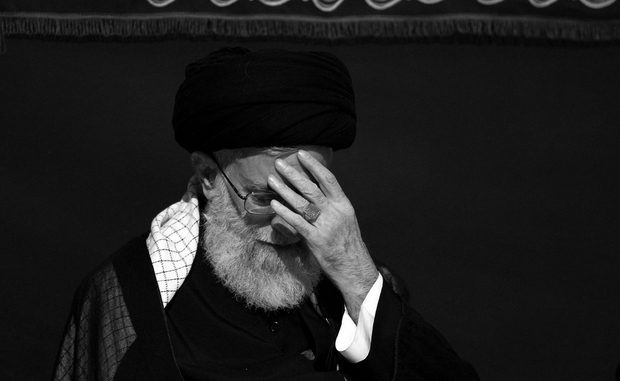
Editorial Source: NCRI
On Monday, the Iranian regime’s Supreme Leader, Ali Khamenei, finally responded to the U.S. decision to withdraw from the Iran nuclear deal.
Khamenei’s remarks came nearly four weeks after President Trump announced that the U.S. would no longer be a party to the Joint Comprehensive Plan of Action (JCPOA), and after European leaders were unable to offer the regime guarantees that U.S. sanctions would not affect their trade relations.
Khamenei ordered the regime’s nuclear agency to take steps to carry out a major increase in uranium enrichment.
“The Atomic Energy Organization of Iran must make the necessary arrangements to reach 190,000 SWU in the framework provided by the JCPOA and must begin some other preparations that the honorable president has ordered beginning tomorrow,” he said.
He described “progress on nuclear technology and missile power” as the regime’s “point of strength,” adding that, “constructing various types of missiles and acquiring missile power guarantees the country’s security.”
One possibility is that Khamenei has decided to expand the regime’s nuclear activities, and his remarks may be the first step to its withdrawal from the JCPOA.
Another possibility is that his remarks are simply a bargaining chip and empty threats aimed at forcing the EU to give more concessions to the regime. What makes this possibility more likely is that Khamenei’s measured remarks specifically stated that expansion of nuclear activity must be within the “framework” of the JCPOA.
Khamenei’s remarks are contradictory in nature. He tries hard to sound tough. Yet, he insists that his decision is within the JCPOA framework. This contradiction stems from the regime’s weakness and vulnerability. On the one hand, to boost the morale of his base, namely the paramilitary Bassij and other repressive forces, Khamenei needs to be seen in a stable position. On the other hand, his regime is in deep crisis and desperately in need of external support for its survival. Simply put, it cannot afford the risks of ending negotiations with Europe. This dilemma explains Khamenei’s contradictory remarks.
Subsequent remarks by Ali Akbar Salehi, head of the regime’s nuclear agency, reveal that the JCPOA, which took effect in 2015, had in fact never fully halted the regime’s advancement of nuclear capability. Salehi said that when regime first signed up to the deal, the Supreme Leader recommended that, “not only should we not destroy the bridges behind us, but we should make new bridges so that if the other party would not uphold its commitment, we would be in a much more advance position than before the JCPOA.”
Salehi added, “Much of the work we have done is emerging gradually, as we could not have announced it back then.”
He acknowledged that since it signed the JCPOA, the regime has made “advanced centrifuges” but “did not announce” it. Yet, he emphasized that this too was within the JCPOA’s framework.
His remarks were equally contradictory. On the one hand, he wants to show strength, but on the other hand, he knows the regime’s vulnerability and is therefore left insisting that their actions were within the JCPOA framework.
Still, the regime’s threat of carrying out higher levels of uranium enrichment prompted France’s Foreign Minister Jean-Yves Le Drian on Wednesday to issue a warning to Tehran not to cross a “red line.”
So, what can be concluded from Tehran’s position?
• If Khamenei and Salehi were speaking seriously and not just intending to boost the morale of their forces, then the regime has already violated the JCPOA, or at the very least, it could be said that this was a clear testimony to the deficiency of the JCPOA.
• The clerical regime is in deep crisis. Offering any concession to the regime is against the interests of the Iranian people and is an attempt to help a corrupt regime that suppresses its own people and is the number one executioner per capita in the world to survive.
• Now is the time to call the regime’s bluff and hold it accountable for its actions in the region.
• Now is the time to end the silence on the systematic human rights violations in Iran and the crimes committed by the regime against the Iranian people.

